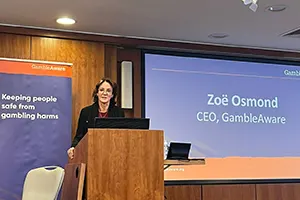 January 4th saw GambleAware’s CEO, Zoë Osmond, issue a statement in response to the Government’s consultation regarding the statutory levy that is set to affect all businesses licensed by the UK Gambling Commission (UKGC). The levy is one of the most crucial proposals in the Government’s Gambling White Paper.
January 4th saw GambleAware’s CEO, Zoë Osmond, issue a statement in response to the Government’s consultation regarding the statutory levy that is set to affect all businesses licensed by the UK Gambling Commission (UKGC). The levy is one of the most crucial proposals in the Government’s Gambling White Paper.
Although Osmond noted that GambleAware views the levy in an overall positive light, she did raise concerns regarding a number of issues that could negatively impact the levy’s effectiveness. A lack of clarity regarding money distribution and the Government’s failure to include plans for the establishment of a National Strategy for the Prevention and Treatment of Gambling Harms are among the core problems outlined in the statement. According to Osmond, the aforementioned strategy would be absolutely crucial for the new system.
A proposal was made that one Prevention and Treatment Commissioner oversee problem gambling services across England, Scotland, and Wales, as this would guarantee that gambling harm resources would be distributed equally. Alternatively, a close professional partnership between different commissioners could be the key to ensuring success. Osmond also expressed GambleAware’s commitment to support the establishment of such a commissioning body and to collaborate with the Government, the NHS, and other entities in order to make the transition to the new system smoother.
The Government Needs to Consider the Different Tiers of Prevention and Treatment
 In the statement, Zoë Osmond stressed that prevention should be a priority in terms of where funds are distributed or that there should at least be “an equal focus on both prevention and treatment.” This is how the Government could ensure the effectiveness of the system in having an impact on problem gambling.
In the statement, Zoë Osmond stressed that prevention should be a priority in terms of where funds are distributed or that there should at least be “an equal focus on both prevention and treatment.” This is how the Government could ensure the effectiveness of the system in having an impact on problem gambling.
GambleAware’s CEO also found the definitions of “treatment and prevention” within the proposal to be insufficient, as they do not acknowledge the several levels gambling harm aid is separated into. Primary (Tier 1) prevention encompasses education, the spread of awareness, and the National Gambling Helpline. Tier 2, on the other hand, is centred on specialist treatments, interventions, and triage, among other forms of help. Finally, we have tertiary (Tier 3) and Tier 4 prevention, which involve community based psychological treatment and residential treatment, respectively.
The absence of these distinctions, especially when it comes to Tier 1 and Tier 2 prevention, would lead to a lack of clarity. According to GambleAware, the Prevention Commissioner should be in charge of Tier 1 and Tier 2 interventions. This would aid in the measures’ effectiveness and ensure that services would be equally accessible across the UK.
The final subject Osmond highlighted is that the smooth transition to the new system can only be guaranteed by providing a clear picture of how the sector and the GambleAware charity itself will be funded. Otherwise, the government risks destabilising the treatment resources and services that operate at present.
- Author


